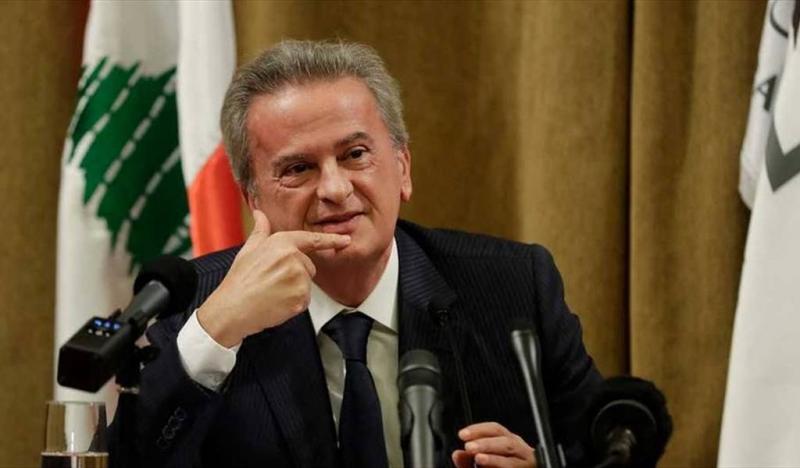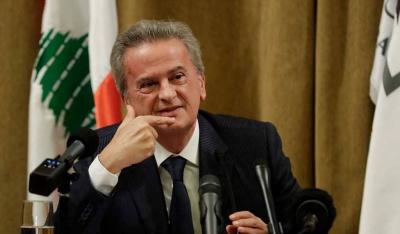As Lebanon's central bank governor Riyad Salameh prepares to step down after 30 years, he leaves behind a country experiencing one of the worst financial crises in the world. BBC correspondent Anna Foster reviews the experiences of a Lebanese man facing economic turmoil on the eve of the governor's departure. Foster recounts: "At first, it was difficult to identify what was in the bottle that 'Omar Awa' was holding in the widely circulated video, but his intention became as clear as day. It was a bank heist at the bank where he deposited his money, using homemade acid to threaten employees to hand over his funds."
She explains: "He told me: I poured some drops on a calculator and on the ground to show that the acid is real, as bubbles and boiling appeared. But Omar was not there to steal others' money; he just wanted to recover his. In the video, he says: 'I only want what's mine! I don't want to hurt anyone!'"
Foster continues: "Omar Awa is one of many customers who have stormed banks to retrieve their savings, which are now worth only a fraction of their real value, the same goes for depositors across Lebanon." The BBC correspondent notes: "Since the financial crisis began here, people's ability to access their money has been extremely limited. If they want to withdraw in US dollars, the exchange rate is so minimal that it is almost worthless. Omar's savings, earned throughout his working life, shrank to the point that he lost over 80% of his life savings. After the heist, he emerged victorious with $6,500, which is all that remains of his money. Omar will use it to pay for necessary surgery on his neck; doctors say that without it, he could be paralyzed. This situation reveals the desperate state of millions of Lebanese who have lost the ability to access their money. But the uptick in bank heists also represents a significant problem; while the term 'heist' does not accurately reflect what depositors are trying to do—simply reclaim their own money—the threats of violence are terrifying for bank employees, who bear little responsibility for these widespread issues."
She adds: "I asked Omar directly: Did you think about the impact on them? He replied: They are like my siblings and I will apologize to them now; I never intended to hurt any of them. But I also hope they understand my situation and where I came from. So, what does this have to do with Omar's plight and Riyad Salameh, one of the longest-serving central bank governors in the world? Along with Lebanon's political class, Salameh has been blamed for the financial mismanagement that caused many of these problems."
During his tenure at the helm of the Central Bank of Lebanon, Salameh has been accused of managing a massive fraud by borrowing new funds to pay off existing creditors until the economy began to collapse, the correspondent states, adding: "When we sat in the bank for a rare interview, Salameh insisted on distancing himself from responsibility for Lebanon's financial issues." He said: "The governor of the central bank is not an independent person; there is a central council that makes decisions, and the governor is merely an executor of those decisions. It is misleading to place all the blame on the governor." He added: "In all central banks around the world, there is no single individual responsible for everything."
While Riyad Salameh is preparing to resign from his position after 30 years, he is being investigated by at least seven countries, including Lebanon, for embezzlement and illicit enrichment. He is accused of laundering over $300 million, which he denies. He explained: "I have provided accurate statements for my personal accounts showing that my wealth comes entirely from my two decades of work in the private sector." He added: "The audited accounts of the central bank show that there were no funds transferred at any time from the central bank to my personal accounts."
However, the allegations against him are serious and varied. In Germany and France, Salameh's assets have been seized, and arrest warrants have been issued for him. Authorities in Switzerland are investigating whether he and his brother Raja illegally embezzled hundreds of millions of dollars from the central bank over a decade. Both brothers have denied any wrongdoing.
Regarding the investigations facing Salameh, Foster clarifies: "Investigations are ongoing in Luxembourg, Monaco, and Belgium. In the UK, where Salameh owns significant assets, neither the Serious Fraud Office nor the National Crime Agency has commented, although sources say his assets are being examined. The Swiss NGO 'Accountability Now' has been investigating Riyad Salameh for several years and has filed criminal complaints in multiple countries. According to Zina Wakim, chairperson of the organization, the European public prosecutor's office suspects Salameh of being part of a criminal organization. She adds: 'It is extremely important that the European public prosecutor's office has accused a central bank governor of belonging to a criminal organization. This is unprecedented.'"
Foster relays Wakim's comments: "Where has the international aid, which was earmarked for the needy in Lebanon, ended up? The UN's UNICEF states that about nine out of ten families can no longer afford basic necessities. Ongoing problems persist with shortages of electricity, medicine, fuel, and food. Over the past five years, $5 billion in international aid has flowed into Lebanon, plus more after the massive explosion at the port of Beirut. We do not know where that money has gone; it was intended for the population. Corruption is the root cause of everything that has happened in Lebanon since the end of the civil war."
Foster asked Salameh whether he would be subject to further questioning by authorities in France, noting that his absence led to the issuance of an international arrest warrant. He attributed this to a communication issue, stating that his lawyer had not been properly informed. She adds: "I came back and asked him why he had not tried to go to France as soon as possible to be interrogated and clear his name upon learning they wanted to question him. However, my repeated attempts to clarify this point were unsuccessful. His final response was: My lawyer informed the judge in writing that I wanted to go to France. He told him, please give us a date for us to come."
He stated he would fly to Paris for questioning in August, as soon as his term as governor of the Central Bank of Lebanon ends. However, it remains to be seen if this will happen in reality. Outside the central bank building, graffiti on the walls leaves no doubt about the public's rising anger toward the banks and those who manage them. There have been attempts to cover over the writing on those walls, but some obscenities are still legible.
The correspondent concludes: "One thing is certain, Riyad Salameh's departure from the top post at the central bank will not be the end of the economic crisis in Lebanon. With no successor named and no real solutions in sight, public anger toward banks in Lebanon will continue to escalate."




